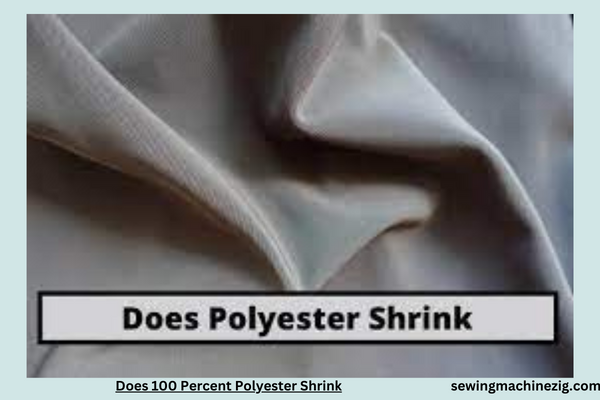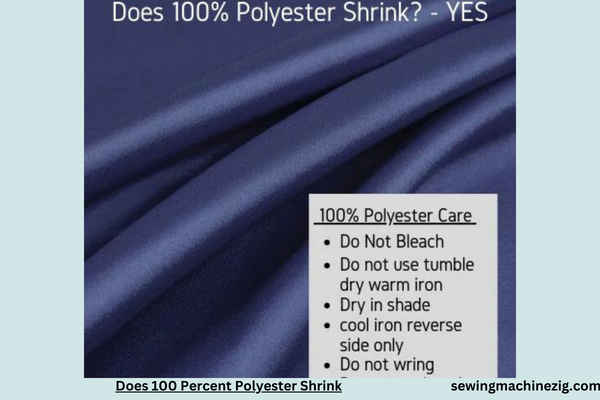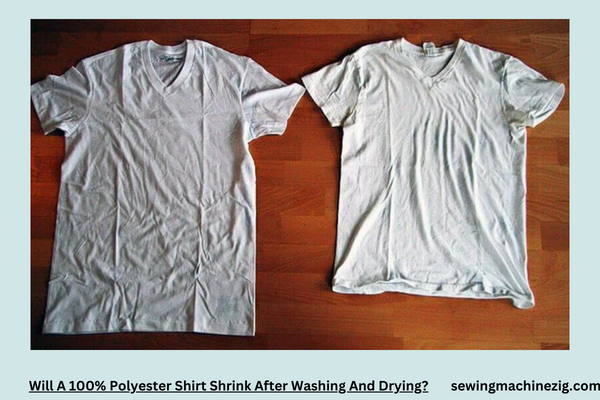
Ever been puzzled by the enigma of polyester—specifically, does 100 percent polyester shrink? The confusion is real, and I get it. Navigating the fabric landscape can feel like deciphering a textile riddle. But fear not! I’m here to demystify the shrinking conundrum. “Does 100 Percent Polyester Shrink“
In this guide, we’ll explore the intricacies of 100 percent polyester and unveil the secrets of whether it succumbs to the shrinking woes. Your fabric-related queries are about to find clarity, making it easy for you to understand the fate of your polyester garments in the wash.
Does 100 Percent Polyester Shrink Detailed Answer

Understanding Polyester’s Composition: Before we embark on the journey to unravel the mystery of polyester shrinkage, let’s take a closer look at what makes up this synthetic fabric. Polyester is a polymer, a type of plastic made from petrochemicals. The fibers are created through a process of extrusion and spinning, resulting in a fabric known for its strength, resistance to wrinkles, and quick-drying properties.
Common Misconceptions:
Polyester has long been associated with the idea that it is impervious to shrinking. This belief stems from the fact that polyester fibers are inherently less prone to changes caused by moisture compared to natural fibers like cotton. While it’s true that polyester is less likely to shrink than some other fabrics, the assumption that it is entirely immune to the phenomenon warrants further investigation.
Factors Influencing Polyester Shrinkage:
Despite its reputation for stability, several factors can contribute to the shrinkage of 100 percent polyester fabric:
- Heat Sensitivity: Polyester has a melting point, and exposure to high temperatures can cause the fibers to warp and contract. This is particularly true for low-quality polyester or garments with embellishments that may not withstand heat.
- Manufacturing Processes: The quality of the manufacturing process plays a role. Cheaply produced polyester garments may be less stable and more prone to distortion when exposed to certain conditions.
- Blends and Weave: Pure polyester fabrics may behave differently than polyester blends. Additionally, the weave of the fabric can impact its ability to withstand heat without shrinking.
Testing for Shrinkage:
If you’re curious about whether your 100 percent polyester garment will shrink, a simple at-home test can provide insights:
- Read the Care Label: Always start by checking the care label on your garment. Manufacturers provide specific washing and care instructions based on the fabric’s properties.
- Test in Cold Water: Wash a small, inconspicuous part of the garment in cold water. Cold water is generally gentler on fabrics and less likely to induce shrinkage.
- Air Dry: Allow the tested area to air dry. Avoid exposing it to high heat, such as using a dryer. Air drying allows you to observe any changes in the fabric.
- Check for Changes: Examine the tested area for signs of shrinkage, distortion, or any other alterations. If there are no noticeable changes, the garment is likely to be more resistant to shrinkage.
Preventing Polyester Shrinkage:
While polyester is generally resilient, taking proactive steps can help prevent or minimize the risk of shrinkage:
- Wash in Cold Water: Opt for cold water when washing polyester garments. This reduces the risk of heat-induced shrinkage.
- Gentle Cycle: Use the gentle cycle on your washing machine. This minimizes the agitation that can contribute to fabric distortion.
- Avoid High Heat: When drying polyester, avoid high heat settings. Opt for low heat or air drying to maintain the fabric’s stability.
- Quality Matters: Invest in high-quality polyester garments. Quality manufacturing processes and materials contribute to a garment’s ability to withstand various conditions.
Summary: Unraveling the Polyester Shrinkage Myth
In summary, the belief that 100 percent polyester is entirely immune to shrinking is a bit of a myth. While polyester is indeed more resistant to shrinkage compared to natural fibers like cotton, it is not entirely impervious, and various factors can influence its behavior. Testing a small area, checking care labels, and adopting gentle washing and drying practices are essential steps to preserve the integrity of polyester garments.
Understanding the science behind polyester, its composition, and the potential factors contributing to shrinkage empowers consumers to make informed choices about caring for their garments. Polyester’s strength lies not just in its resistance to shrinkage but also in the knowledge of how to maintain and prolong the life of this versatile fabric.
Summary: The myth that 100 percent polyester is entirely resistant to shrinkage is dispelled through an exploration of its composition and the various factors that can influence its behavior. While polyester is less prone to shrinking than some natural fibers, it is not entirely immune, and heat sensitivity, manufacturing processes, and other factors can play a role.
By understanding Does 100 Percent Polyester Shrink, these dynamics and adopting appropriate care practices, consumers can confidently enjoy the durability and versatility of polyester garments while minimizing the risk of shrinkage.
Will A 100% Polyester Shirt Shrink After Washing And Drying?

Understanding the Polyester Puzzle:
Polyester, a synthetic fiber derived from petrochemicals, boasts qualities such as durability, wrinkle resistance, and moisture-wicking capabilities. Unlike natural fibers, such as cotton, polyester is less prone to changes caused by moisture. Its molecular structure and resilience set it apart as a fabric that seemingly defies the common fate of shrinkage.
The Conventional Wisdom:
Polyester has long been hailed as a low-maintenance fabric that retains its shape and size even after multiple washes. This reputation has led to the widespread belief that 100% polyester garments are impervious to shrinkage. The assumption is rooted in the fact that polyester fibers do not absorb moisture in the same way as natural fibers, minimizing the risk of contraction.
Factors Influencing Polyester Shrinkage:
While polyester is indeed less prone to shrinkage than fabrics like cotton, it is not entirely exempt from the possibility. Several factors can influence the behavior of a 100% polyester shirt after washing and drying:
- Heat Sensitivity: Polyester has a melting point, and exposure to high temperatures can cause the fibers to warp and contract. This is particularly relevant for low-quality polyester or garments with embellishments that may not withstand heat.
- Fabric Quality: The quality of the polyester fabric itself plays a role. Higher-quality polyester is generally more stable and less susceptible to distortion during washing and drying.
- Garment Construction: The way the garment is constructed, including the stitching and overall design, can impact its ability to withstand the stresses of washing and drying without shrinking.
- Environmental Factors: Extreme environmental conditions, such as prolonged exposure to direct sunlight or high humidity, can influence the fabric’s stability.
The Experiment: Testing Shrinkage Potential:
To demystify the puzzle of polyester shrinkage, conduct a simple experiment to test the behavior of your 100% polyester shirt:
- Read the Care Label: Begin by consulting the care label on your shirt. Manufacturers provide specific washing and care instructions based on the fabric’s properties.
- Wash in Cold Water: Wash a small, inconspicuous part of the shirt in cold water. Cold water is generally gentler on fabrics and less likely to induce shrinkage.
- Air Dry: Allow the tested area to air dry. Avoid exposing it to high heat, such as using a dryer. Air drying allows you to observe any changes in the fabric.
- Check for Changes: Examine the tested area for signs of shrinkage, distortion, or any other alterations. If there are no noticeable changes, the garment is likely more resistant to shrinkage.
Preventive Measures for Polyester Care:
While polyester is generally resilient, taking proactive steps can help prevent or minimize the risk of shrinkage:
- Wash in Cold Water: Opt for cold water when washing polyester garments. This reduces the risk of heat-induced shrinkage.
- Gentle Cycle: Use the gentle cycle on your washing machine. This minimizes the agitation that can contribute to fabric distortion.
- Avoid High Heat: When drying polyester, avoid high heat settings. Opt for low heat or air drying to maintain the fabric’s stability.
- Quality Matters: Invest in high-quality polyester garments. Quality manufacturing processes and materials contribute to a garment’s ability to withstand various conditions.
In summary, the belief that 100% polyester shirts are entirely resistant to shrinkage is not a one-size-fits-all truth. While polyester is less prone to shrinkage compared to natural fibers, it is not entirely exempt, and various factors can influence its behavior.
By understanding Does 100 Percent Polyester Shrink, the science behind polyester, testing shrinkage potential, and adopting proper care practices, you can navigate the polyester landscape with confidence. Polyester’s resilience lies not just in its inherent properties but in the knowledge of how to maintain and prolong the life of garments made from this synthetic fabric.
As you continue to explore the world of textiles, remember that each garment, even if 100% polyester, may respond uniquely to environmental conditions and care practices.
Conclusion
In conclusion, understanding the properties of 100 percent polyester unveils its remarkable resistance to shrinkage. Unlike natural fibers, polyester’s synthetic composition makes it resilient to the effects of heat and stretching, maintaining its shape over time. While extreme conditions may cause minimal shrinkage, everyday care and laundering within recommended parameters ensure the longevity of polyester garments.
Embrace the durability and stability of 100 percent polyester, confident that it will withstand the test of time without succumbing to the common issue of fabric shrinkage.
FAQs – Does 100 Percent Polyester Shrink:
Q1: Can 100 percent polyester fabric shrink?
A1: Generally, 100 percent polyester is resistant to shrinking, as it is a synthetic material with low susceptibility to heat.
Q2: Under what conditions might 100 percent polyester shrink?
A2: Extremely high heat, such as from an iron on high settings or a very hot dryer, may cause minimal shrinkage in polyester fabric. “Does 100 Percent Polyester Shrink“
Q3: Can washing polyester in hot water cause it to shrink?
A3: Polyester is resilient to hot water, and it’s unlikely to shrink significantly during regular washing. “Does 100 Percent Polyester Shrink“
Q4: Does 100 percent polyester shrink more than polyester blends?
A4: Pure polyester is less prone to shrinkage compared to polyester blends, which may contain natural fibers. Does 100 Percent Polyester Shrink“
Q5: Can stretching polyester fabric lead to permanent size increase?
A5: Polyester is known for retaining its shape, so stretching is unlikely to result in permanent size increase or stretching.
Q6: What’s the best way to care for 100 percent polyester to prevent any shrinkage?
A6: Follow care labels, wash in cold or lukewarm water, and avoid high heat from irons or dryers to maintain polyester’s shape.



